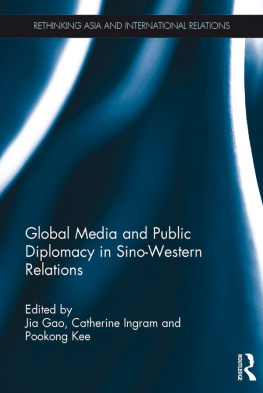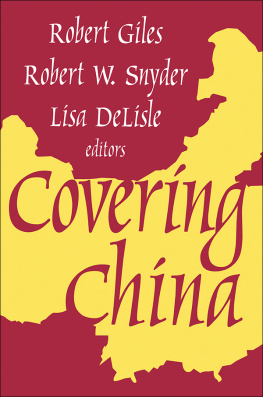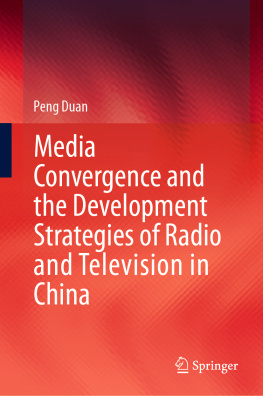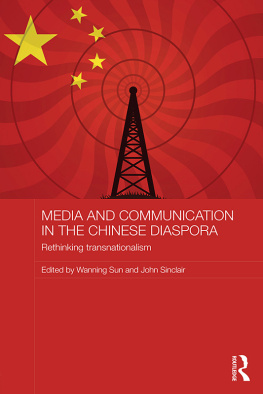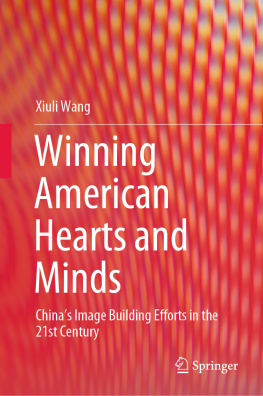Reporting for China was made possible in part by a grant from the Chiang Ching-kuo Foundation for International Scholarly Exchange.
Copyright 2017 by the University of Washington Press
Printed and bound in the United States of America
21 20 19 18 17 5 4 3 2 1
All rights reserved. No part of this publication may be reproduced or transmitted in any form or by any means, electronic or mechanical, including photocopy, recording, or any information storage or retrieval system, without permission in writing from the publisher.
University of Washington Press
www.washington.edu/uwpress
Library of Congress Cataloging-in-Publication Data
Names: Nyri, Pl, author.
Title: Reporting for china : how Chinese correspondents work with the world / Pl Nyri.
Description: Seattle : University of Washington Press, [2017] | Includes bibliographical references and index.
Identifiers: LCCN 2016026505| ISBN 9780295741307 (hardcover : alk. paper) | ISBN 9780295741314 (pbk. : alk. paper)
Subjects: LCSH: JournalismChina. | Foreign correspondentsChina. | Foreign NewsChina. | Press and politicsChina.
Classification: LCC PN5364 .N95 2017 | DDC 079.51dc23
LC record available at https://lccn.loc.gov/2016026505
The paper used in this publication is acid-free and meets the minimum requirements of American National Standard for Information SciencesPermanence of Paper for Printed Library Materials, ANSI Z39.481984.
Acknowledgments
R ESEARCH for this book was supported in large part by an Independent Social Research Fellowship. I thank the Independent Social Research Foundation for their flexible, unbureaucratic, and genuinely helpful way of advancing research.
I am grateful to the journalists, editors, and others who have put me in touch with their colleagues, particularly Zhang Hong, Yang Shanshan, Zhou Gufeng, Wu Chen, Vincent Ni, Guan Juanjuan, Zhang Xiaoyu, Yuan Zhenyu, Sam Xu, Jia Yanning, He Shenquan, Wang Fang, Zeng Guohua, Evan Osnos, Qi Fei, and Garrie van Pinxteren. I am indebted to Mikkel Bunkenborg, Iginio Gagliardone, and Garrie van Pinxteren for helpful discussions, and to Wang Zhongyuan and Zhang Jialu for pointing me to online discussions of Chinese media. Li Lin helped collate and analyse online texts.
Finally, thank you to Lorri Hagman, who advanced her trust in this book and then saw it to completion with her usual thoroughness, and to the two anonymous reviewers who were helpful, sympathetic, and very well informed.
Some material in was previously published in Pl Nyri, Reporting for China: Cosmopolitan Attitudes and the Chinese Perspective among Chinese Correspondents Abroad, New Global Studies 8(3): 22344 (2014).
REPORTING FOR CHINA
INTRODUCTION
China and the World
A T the beginning of the new millennium, relatively few Chinese traveled internationally, and blogging had not yet become popular. For most Chinese, international news came from official media, most of which relied, in turn, either on translated foreign sources or on the reports of the main news agency, Xinhua.
In 2015, 120 million Chinese travelled abroad to study, conduct business, buy brand-name handbags or real estate, spend time on the beach or see famous temples, work on construction sites, consult corporate clients, volunteer as English teachers in urban slums, and for a myriad other reasons. As tourists, they are the worlds biggest spenders. As students, they have long been the largest group among those studying outside their home countries; as expatriate managers and engineers accompanying the globalization of Chinese companies, they are poised to become one of the largest groups working outside their home countries. China has even become the largest source country of international student volunteers placed by the worlds largest student association, AIESEC.
As the ways Chinese people engage with the world and with non-Chinese expand, so does their need to understand and to be understood. Previously formed stereotypes and suspicions may be confirmed or contradicted by personal experiences. The Chinese state, which has long considered itself responsible for the management of all relations with foreign countries at any level, can no longer always keep control of them. When, in 2005, Chinese tourists staged a sit-in at the Malaysian gambling resort of Genting because they were offended at receiving meal tickets with the image of a pig (apparently meant to indicate that they could be served pork, but taken as a slur), or when, in 2013, Chinese bus drivers in Singapore struck to demand better working conditions, neither local nor Chinese authorities were sure how to manage the conflict. The Chinese government is keen to promote the expanding presence of Chinese around the world as a testament to Chinas benevolent rise, but is hesitant and ill-equipped to defend the interests of its citizens and corporations when they encounter conflicts, sometimes appearing heavy-handed and other times negligent, alternately stoking and fending off waves of angry nationalism. This expanding and sometimes conflicted global engagement is perhaps nowhere more poignantly illustrated than in the response by the Chinese people, government, and media to the disappearance of a Malaysia Airlines plane in 2014 with 154 Chinese passengers aboard, a story that will surface several times in this book.
In the West, most of the recent interest in Chinas emergence as a global economic, political, and increasingly military power has centered on the Party-states desire and ability to impose its rules on others, and on how other countries might benefit or suffer from such imposition. The protagonist of these engagements is an affluent, urban, and largely young population that frequently combines nationalism with individualism, curiosity about the world and a sense of being misunderstood by it, and hope for growing prosperity with anxieties about the environment, health, and the futures of their children. Even for many of those who are not already engaged with the world outside China in some personal capacity and do not have relatives or friends living abroadmost doforeign countries are the subject of at least occasional discussion as destinations of one sort or another.
Few generations anywhere have been thrust into the world so rapidly yetdespite a consistent interest in foreign countriesknow so little about it. This is where the prodigious amount of writing and images about the world, produced by professional journalists, semiprofessional online writers, and casual commentators with mobile phones, come into the picture.
FOLLOWING CHINESE CORRESPONDENTS
For over two decades, I have been studying the facets of the entrepreneurial migration from China that began with Chinese traders in the late 1980s and subsequently expanded geographically across much of the globe, and, in terms of business, from trade in cheap consumer goods to real estate, manufacturing, and the brokerage of complicated investment deals channeling capital from China. Throughout this research, I have been interested in the way Chinese migrants see the world in which they live and travel and their, as well as Chinas, place in it.
In the last few years, the motives for and ways of leaving China have become more diverse. But in terms of social composition, urban professionals make up an increasing share of those who leave. They are a diverse group, but, like expats from other countries, they are distinguished by a rapid mobility and a secure social position within the home society. They are strongly tied to organizations in China and often have relatively privileged living conditions abroadparticularly in relation to other Chinesebut their relations with the surrounding society have to be negotiated. Although they are exposed to more of the world than most other migrants, it is up to them to engage with it and let these engagements shape their worldviews.


